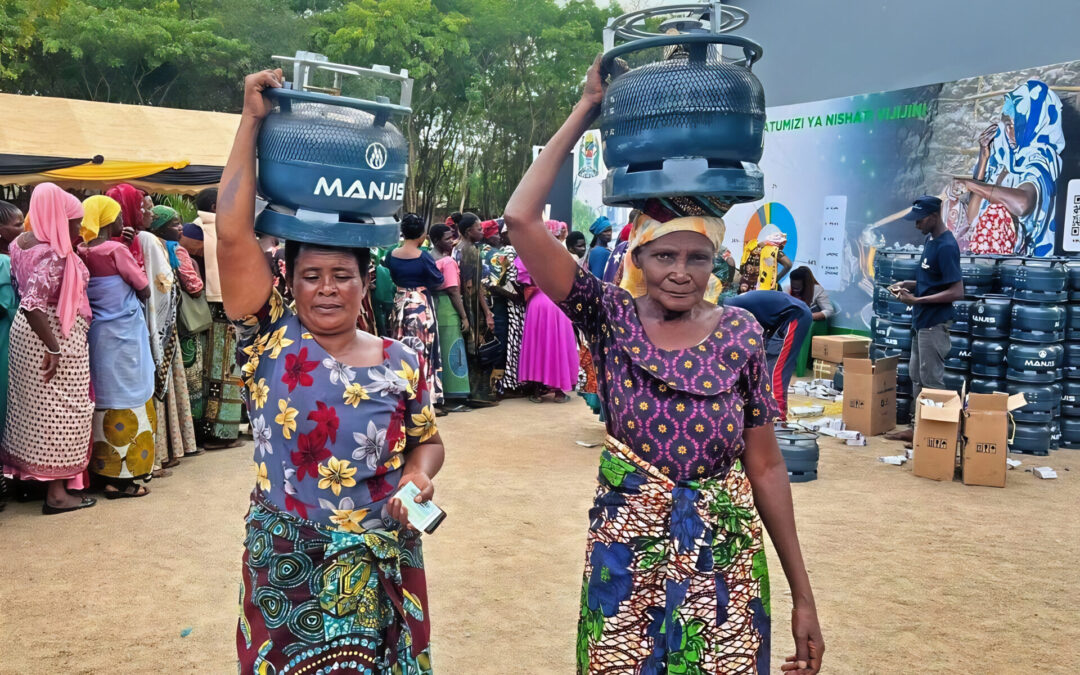The Clean Energy for Cooking Agenda: A Pathway to Sustainable Cooking in Tanzania
The Clean Energy for Cooking Agenda has been developed with the objective of ensuring that all Tanzanians have access to clean energy products for cooking at an affordable price. This initiative represents a significant step towards achieving the Sustainable Development Goals, improving public health and protecting the environment.

Addressing the Need for Clean Cooking Solutions
In Tanzania, a considerable proportion of the population relies on traditional biomass fuels, including wood, charcoal, and agricultural residues, for cooking purposes. These fuels are not only inefficient in terms of energy utilisation but also pose significant health risks due to the presence of indoor air pollution. According to the World Health Organization (WHO), exposure to smoke from traditional cookstoves and open fires causes respiratory illnesses, which have a particularly adverse impact on women and children. The Clean Energy for Cooking Agenda (CE4C) aims to address these challenges by promoting the use of clean and efficient cooking technologies.
Objectives of the Agenda
The Clean Energy for Cooking Agenda is informed by a number of key objectives, which serve to guide its overall direction and strategy:
- Universal Access: Ensuring that every household in Tanzania has access to modern, clean cooking technologies and fuels.
- Improved Health: Reducing the health risks associated with traditional cooking methods, such as respiratory illnesses and burns.
- Environmental Protection: Mitigating climate change and protecting the environment by reducing carbon emissions and deforestation.
- Economic Empowerment: Creating job opportunities and boosting economic growth through the production and distribution of clean cooking solutions.
Key Strategies
In order to achieve its stated objectives, the Clean Energy for Cooking Agenda employs a comprehensive set of strategies:
- Subsidies and Incentives: Providing financial support to households and businesses to purchase and adopt clean cooking technologies. This includes subsidies, financing options, and innovative business models to make clean energy products more affordable for low-income households.
- Technology Development: Investing in research and development to improve the efficiency and affordability of clean cooking solutions. This includes supporting local manufacturing to create jobs and stimulate the local economy.
- Awareness and Behavior Change: Conducting educational campaigns to inform the public about the benefits of clean cooking technologies and the health risks associated with traditional cooking methods. Promoting behavior change towards sustainable practices is crucial for the success of the agenda.
- Public-Private Partnerships: Fostering collaboration between government agencies, private sector companies, and non-governmental organizations. Strengthening policy frameworks and developing and enforcing policies that support the adoption of clean cooking solutions are essential components of this strategy.
Potential Impact
The implementation of the Clean Energy for Cooking Agenda has the potential to transform the lives of Tanzanians in several ways:
- Improved Health Outcomes: Reduced exposure to harmful pollutants will lead to improved respiratory health and reduce the risk of burns.
- Economic Benefits: Clean cooking solutions can save households money on fuel and healthcare costs, freeing up resources for other essential expenses. The promotion of local manufacturing and the creation of new markets for clean energy products will boost the economy.
- Environmental Sustainability: Reduced carbon emissions and deforestation will contribute to climate change mitigation and environmental protection.
- Job Creation: The production, distribution, and maintenance of clean cooking solutions will create new employment opportunities, empowering communities and fostering economic growth.
Challenges and the Way Forward
Despite the considerable potential of the Clean Energy for Cooking Agenda, its implementation is confronted with a number of significant challenges. These include the high initial cost of clean energy products, the lack of infrastructure in rural areas, and the resistance to change from traditional cooking practices. In order to surmount these obstacles, it is imperative that:
- Increase Investment: Attract both public and private investment to expand the reach of clean cooking solutions.
- Build Infrastructure: Develop the necessary infrastructure to support the distribution and maintenance of clean energy products.
- Engage Communities: Work closely with local communities to understand their needs and preferences, ensuring that solutions are culturally acceptable and user-friendly.
The Clean Energy for Cooking Agenda represents a transformative initiative with the potential to significantly enhance the quality of life for millions of Tanzanians. By guaranteeing access to cost-effective and energy-efficient cooking solutions, Tanzania can make considerable strides towards a healthier, more sustainable, and economically vibrant future. With the backing of all relevant parties, the CEC Agenda has the potential to transform the cooking landscape in Tanzania and pave the way for a brighter future for its people.
The Need for Clean Energy in Cooking
In Tanzania, a significant proportion of the population relies on traditional biomass fuels, including wood, charcoal, and agricultural residues, for cooking. Furthermore, these fuels are not only inefficient but also pose a significant health risk due to the contamination of indoor air. As stated by the World Health Organization, exposure to smoke from traditional cookstoves and open fires causes respiratory illnesses, which affect women and children in particular.
These fuels, while readily available and inexpensive, have a number of drawbacks that impact both health and the environment.
Health Risks
The combustion of traditional biomass fuels is an inefficient process, resulting in the production of a considerable quantity of smoke. The smoke produced contains a number of harmful pollutants, including particulate matter, carbon monoxide and volatile organic compounds. As stated by the World Health Organization (WHO), exposure to these pollutants from traditional cookstoves and open fires represents a significant risk factor for the development of respiratory illnesses, including chronic obstructive pulmonary disease (COPD), pneumonia, and lung cancer. It is notable that women and children are particularly vulnerable, given that they typically spend more time in close proximity to the cooking area. The WHO estimates that indoor air pollution from these sources is responsible for millions of premature deaths annually, with a significant burden in low-income countries such as Tanzania.
Environmental Impact
Furthermore, the extensive utilisation of biomass fuels has profound environmental repercussions. Deforestation represents a significant environmental concern, as trees are harvested for the production of firewood and charcoal. This not only results in the depletion of forest resources but also contributes to soil erosion and the loss of biodiversity. Furthermore, the combustion of biomass fuels results in the release of carbon dioxide and other greenhouse gases into the atmosphere, thereby accelerating the process of climate change. The environmental degradation caused by deforestation and carbon emissions represents a further threat to the livelihoods of rural communities, who depend on natural resources.
Economic Burden
The reliance on traditional biomass fuels places an economic burden on households. The collection of firewood is a time-consuming activity, often necessitating the investment of several hours each day. Such time could be better allocated to educational pursuits, income-generating activities, or other productive endeavours. Furthermore, the health issues caused by indoor air pollution result in increased medical expenses and lost productivity, thereby placing additional strain on household finances.
The Role of Clean Energy Solutions
The transition to clean energy solutions for cooking, such as liquefied petroleum gas (LPG), biogas, and electric stoves, has the potential to address the aforementioned challenges. Clean cooking technologies are more efficient and produce minimal to no harmful emissions, thereby markedly enhancing indoor air quality. The reduction in reliance on biomass fuels that clean energy solutions facilitate can contribute to the mitigation of deforestation and the lowering of greenhouse gas emissions. Furthermore, the implementation of clean cooking technologies can result in time savings and a reduction in the economic burden on households, thereby facilitating greater economic empowerment and an enhanced quality of life.
It is imperative that Tanzanians have access to clean energy for cooking, as this will have a significant impact on their health, environmental sustainability and economic well-being. The implementation of clean cooking solutions offers a potential pathway to a healthier and more sustainable future, addressing the health risks associated with traditional biomass fuels, protecting the environment, and alleviating the economic burden on households. The objective of the Clean Energy for Cooking Agenda is to facilitate the accessibility and affordability of these solutions for all Tanzanians, thereby ensuring a brighter and more prosperous future for the nation.
Objectives of the Agenda
The Clean Energy for Cooking Agenda aims to address these challenges by:
- Promoting Access to Clean Energy Products: Ensuring that all households, especially those in rural and underserved areas, have access to affordable and efficient cooking solutions such as LPG (liquefied petroleum gas), biogas, and electric stoves.
- Enhancing Affordability: Implementing subsidies, financing options, and innovative business models to make clean energy products more affordable for low-income households.
- Raising Awareness: Conducting educational campaigns to inform the public about the benefits of clean cooking technologies and the health risks associated with traditional cooking methods.
- Supporting Local Manufacturing: Encouraging the development and production of clean cooking technologies within Tanzania to create jobs and stimulate the local economy.
- Strengthening Policy Frameworks: Collaborating with government agencies, NGOs, and private sector partners to develop and enforce policies that support the adoption of clean cooking solutions.
Benefits of the Agenda
The successful implementation of the Clean Energy for Cooking Agenda will bring numerous benefits to Tanzanian society:
- Health Improvements: Reduced exposure to harmful smoke will lead to lower rates of respiratory diseases and other health issues.
- Environmental Protection: Decreased reliance on biomass fuels will help reduce deforestation and greenhouse gas emissions.
- Economic Growth: The promotion of local manufacturing and the creation of new markets for clean energy products will boost the economy.
- Empowerment of Women: Access to clean cooking technologies will save time and effort for women, who are primarily responsible for cooking, allowing them to engage in other productive activities.
Challenges and the Way Forward
Despite the considerable potential of the Clean Energy for Cooking Agenda, its implementation is confronted with a number of significant challenges. These include the high initial cost of clean energy products, the lack of infrastructure in rural areas, and the resistance to change from traditional cooking practices.
To overcome these challenges, it is essential to:
- Increase Investment: Attract both public and private investment to expand the reach of clean cooking solutions.
- Build Infrastructure: Develop the necessary infrastructure to support the distribution and maintenance of clean energy products.
- Engage Communities: Work closely with local communities to understand their needs and preferences, ensuring that solutions are culturally acceptable and user-friendly.
In conclusion, the Clean Energy for Cooking Agenda represents a transformative initiative with the potential to significantly enhance the quality of life for millions of Tanzanians. By guaranteeing access to affordable and efficient cooking solutions, Tanzania can make considerable strides towards a healthier, more sustainable, and economically vibrant future.
The Clean Energy for Cooking Agenda represents a bold and ambitious initiative with the objective of improving the lives of all Tanzanians. The provision of access to clean, affordable, and sustainable cooking solutions will contribute to improvements in health, economic empowerment, and environmental protection. With the backing of all relevant parties, the CEC Agenda has the potential to transform the cooking landscape in Tanzania and pave the way for a brighter future for its people.
Tanzania Media
- Kanyala Ferry Launch: TEMESA’s New Service for 15,000 Sengerema Residents (Mwanza) - 18 August 2025
- Russia-Tanzania Naval Cooperation: How the Smolny Training Ship Boosts Dar es Salaam’s Maritime Security - 18 August 2025
- Tanzania’s ICGLR Commitment: Stabilising the DRC & Great Lakes Region - 18 August 2025



























